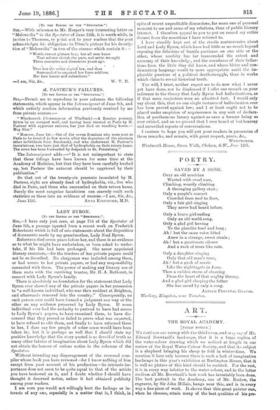LADY BYRON.
[To THS EDITOR OP THE " BPSCTATOR." I
have only just seen, at page 754 of the Spectator of June 5th, a passage (quoted from a recent work on Frederick Robertson) which is full of mis-statements about the disposition of documents made by my grandmother, Lady Noel Byron.
Robertson died seven years before her, and there is no evidence as to what he might have undertaken, or been asked to under- take, if his life had been prolonged. She never appointed literary executors,—for the trustees of her private papers could not be so described. No clergyman was included among them, or had access to her private papers, or had any responsibility connected with them. The power of making any literary use of them rests with the surviving trustee, Mr. H. A. Bathurst, in concert with Lady Byron's family.
There is absolutely no foundation for the statement that Lady Byron ever showed any of the private papers in her possession to "a well-known individual, who was then resident at Brighton, and afterwards removed into the country." Consequently, no such person ever could have formed a judgment one way or the other on any evidence preserved by Lady Byron. If some individual ever had the audacity to pretend to have had access to Lady Byron's papers, to have examined them, to have dis- covered that they proved or failed to prove what was expected, to have refused to edit them, and finally to have returned them to her, I dare say few people of sober sense would have been taken in; but it is perhaps as well that I should state my positive knowledge that the story quoted is as devoid of truth as many other fabrics of imagination about Lady Byron which did not obtain the honour of serious notice in the columns of the Spectator.
Without intending any disparagement of the reverend com- piler whose book you have reviewed—for I know nothing of him except from your account of his production—its intrinsic im- portance does not seem to be quite equal to that of the article you have bestowed on it, and I doubt whether I should have thought it deserved notice, unless it had obtained publicity among your readers.
I am sure you would not willingly hurt the feelings or in- terests of any one, especially in a matter that is, I think, in spite of recent unprofitable discussions, far more one of personal moment to me and some of my relations, than of public literary interest. I therefore appeal to you to put on record my entire dissent from the assertions I have referred to.
I have steadily kept out of the sterile controversies about Lord and Lady Byron, which have had little or no result beyond exposing the delusions of frantic partisans on one side or the other, whose acerbity has far transcended the extent and accuracy of their knowledge, and the soundness of their induc- tions from the little they did know, and whose bitter and con- demnatory language would be more appropriate amid the im- placable passions of a political death-straggle, than in works which claim to reveal historical truth.
You will, I trust, neither expect me to do now what I never yet have done, nor be displeased if I offer one remark on your reference to the theory that Lady Byron had hallucinations, as if that mere conjecture were an admitted fact. I would only say about this, that no one single instance of hallucination ever has been proved against her; and I at least ought not to be placed under suspicion of acquiescence in any sort of declara- tion of posthumous lunacy against as sane a human being as ever existed, and on no ground that I ever heard of but hearsay and unverified reports of conversations.
I venture to hope you will put your readers in possession of these remarks, and remain, with great respect, yours, &c., WENTWORTIf. Wentworth House, Swan Walk, Chelsea, S.W., Tune 12th.




































 Previous page
Previous page